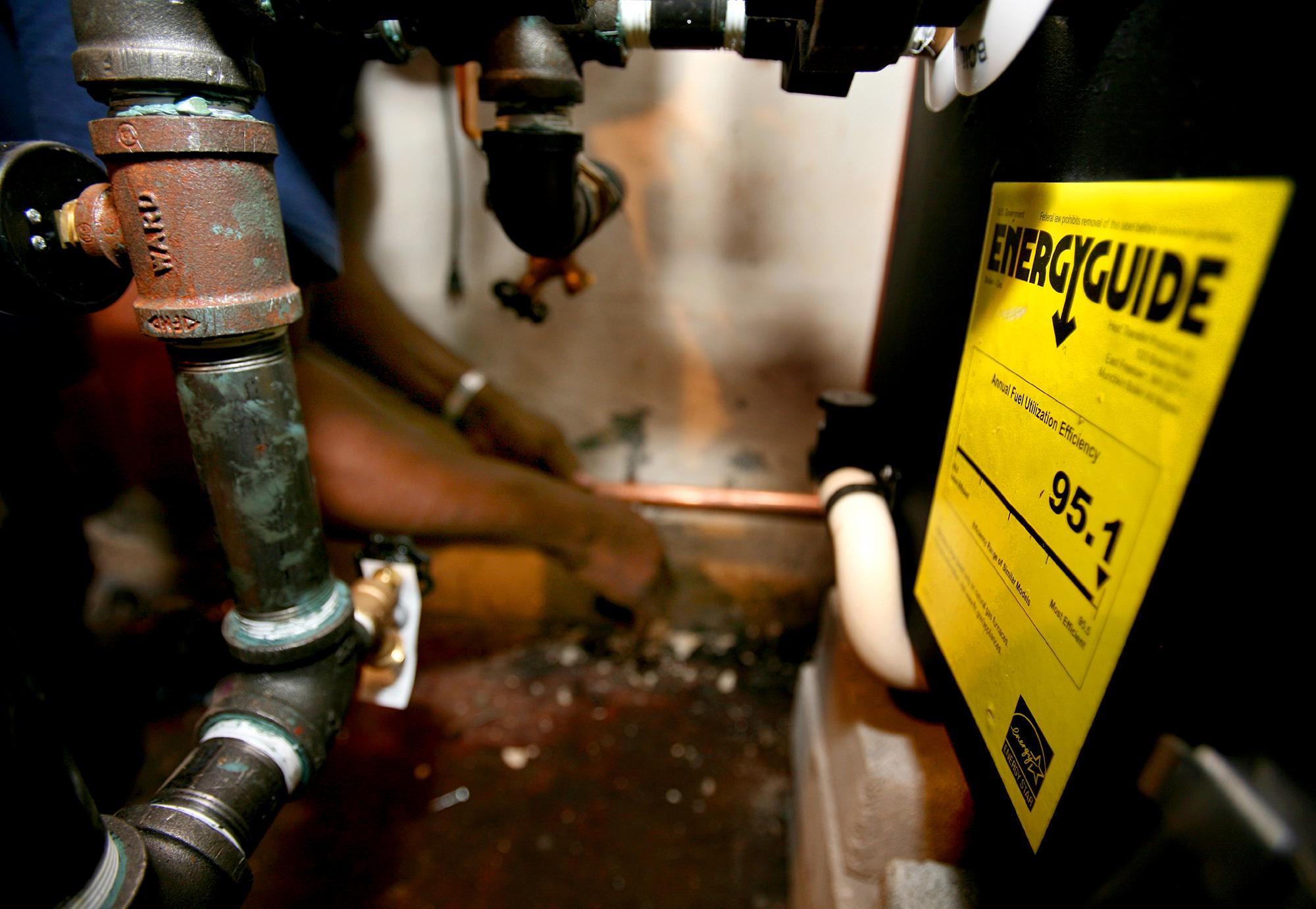
Colorado appears to be the latest state where the fossil fuel industry is seeking to pass off a corporate influence campaign as a grassroots effort to support consumer access to natural gas.
A recording obtained by CPR News reveals Coloradans for Energy Access, a coalition to defend access to gas stoves and water heaters, is being led by a natural gas utility and a strategic communication firm, raising questions about whether state regulations are strong enough to ensure ratepayers aren’t helping finance the effort to beat back local climate policies.
An op-ed in the Colorado Sun announced the new coalition in late January. Coloradans for Energy Access would take a stand against "forced electrification," a term used to describe state and local policies designed to reduce climate-warming emissions by limiting natural gas in buildings. The column warned the trend would hurt low-income Coloradans and threaten a reliable energy source. The coalition’s members included some of the state’s largest utilities, business groups and labor unions.
Neither the opinion piece nor a website for the new coalition mention FTI Consulting, a strategic communications firm with a history of leading influence campaigns for the oil and gas industry. In the webinar for allies in the barbeque and fireplace industry, William Allison, a senior director at FTI, told attendees the firm was ready to ghostwrite similar opinion pieces in the future.
"We can help you write it. We can help you get a place with the paper or whatever you want. We can do as little or as much as needed," Allison said.
Coalition members insist Coloradans for Energy Access is not a front group. Two union leaders who signed the op-ed, Richard Meisinger with IBEW Local 111 and Gary Arnold with Denver Local Pipefitters 208, said the group is a “member-driven” and “grassroots” effort to educate the public about how natural gas can help reduce emissions and ensure affordable energy costs. Other authors of the Colorado Sun op-ed did not respond to requests for comment.
The recording also shows Atmos Energy, the nation’s largest gas-only utility, is a leading force inside the 23-member coalition. During the meeting, Jennifer Altieri, a vice president of public affairs for the Texas-based company — which delivers gas service to about 120,000 customers across Colorado — told attendees her industry couldn’t defend natural gas alone. It needed the help of “multiple voices” to protect the product in “multiple ways.”
The participation of regulated utility companies in the natural gas coalition has alarmed consumer watchdogs and at least one state lawmaker. Their concern is Colorado energy customers might be contributing to the new influence campaign. All of the utilities involved with Coloradans for Energy Access deny that's the case.
Still, Joe Pereira, the deputy director of the Colorado Office of the Utility Consumer Advocate, said current Colorado regulations provide little opportunity for verification.
“We have to take utilities’ word for the fact that they’re not using customer dollars for this,” Pereira said.
A coalition worried about 'death by a thousand cuts'
The Rocky Mountain Hearth, Patio & Barbecue Association organized the Feb. 7 webinar as a member of the coalition. CPR News verified details about the webinar with a post to the organization’s Facebook page.
The new organizing effort comes as political battles over natural gas heat up across the country. Unlike gas stoves or furnaces, electric appliances are as clean as the grid they’re plugged into, which means buildings will become more climate-friendly as the use of renewable sources like wind and solar grows.
The potential benefits have spurred a movement to "electrify everything" to avoid the worst consequences of climate change. In the last few years, some progressive communities like Berkeley, Calif., and New York City have passed ordinances to ban natural gas hookups in new buildings. In Colorado, the Geos Neighborhood, an environmental subdivision in Arvada, has fought to keep gas lines out of the development as it expands.
Electrification is also a key strategy in Gov. Jared Polis’ climate roadmap. Most Colorado buildings rely on natural gas or propane for heat, which adds up to about 10 percent of the state’s overall output of climate-warming gasses. A rapid shift to electricity by 2030 could cut overall emissions equal to taking 760,000 of today’s cars off the road, according to a state study.
During the webinar, Allison with FTI Consulting, which is headquartered in Washington, D.C., and has offices in Denver and other cities, told attendees that progressive city officials and state political leaders in Colorado have opted for "below-the-radar" efforts to encourage electricity over the methane-based fuel.
Allison pointed to two main examples: Denver's 2021 ordinance to gradually electrify large buildings and a current proposal before Colorado's Public Utilities Commission to force individuals or companies to pay to be connected to a natural gas system. Utility customers have traditionally subsidized the cost of those line extensions.
"It's kind of been a 'death by 1,000 cuts' kind of thing," Allison told attendees. "What we're trying to avoid is where we wake up one day and suddenly we don't have access to gas."
Allison encouraged webinar participants to submit public comments voicing their opposition to Colorado utility regulators. The commission has received dozens of letters opposing the rule ahead of its March 7 hearing on the proposal, including objections from some Coloradans for Energy Access coalition members.
One strategy the coalition won't pursue is Atmos Energy's preferred approach in red states. During the call, Altieri with Atmos Energy said the natural gas utility has successfully lobbied for "an all-fuels bill" in Kansas that blocks cities and counties from restricting natural gas access. Eighteen other states have passed similar laws as of January, according to S&P Global.
Altieri said it's impractical to pass similar legislation in Colorado since Democrats control every branch of state government. A better option, she told attendees, would be to "educate" the public about efforts to discourage natural gas use, especially since internal polls have found 8 in 10 Coloradans think any switch to electric appliances should be voluntary. CPR News asked Atmos Energy and FTI Consulting for copies of the survey, but they were not provided.
"You're never going to win over those naysayers and people who just hate the products and want to keep it in the ground, but there's a great opportunity for the middle portion of folks who don't know what's going on," she said.

A network of 'grassroots' organizations
Coloradans for Energy Access is the latest in a string of purported grassroots coalitions FTI Consulting has helped build for the oil and gas industry. A 2020 report in the New York Times found the company has organized corporate influence campaigns across the country on behalf of some of the world's largest oil and gas companies.
FTI Consulting has often omitted its own role in this work, the New York Times reports. A similar pattern now appears to be at play in Colorado. The firm is not listed anywhere on the website for Coloradans for Energy Access nor the op-ed about the new effort in the Colorado Sun. However, it’s not uncommon for consultants and public relations firms to write opinion articles and other public messaging stamped with clients’ names. Paperwork was filed earlier this year to register the coalition as a nonprofit.
FTI spokesperson Matthew Bashalany told CPR News the firm does not “comment on, confirm or deny client engagements or reports of client engagements.”
Not all of FTI Consulting’s work happens outside of public view. In Colorado, the company facilitated a survey on behalf of Suncor Energy, a Canadian company operating the state's only oil and gas refinery in Commerce City.
Other parts of the pro-natural gas coalition have been cleared to speak to the press. Gary Arnold, the business manager for Denver Pipefitters Local 208, said his union joined to help inform the public about the benefits of natural gas and the trade-offs of electric alternatives. He told CPR News that FTI Consulting’s involvement in the group doesn't change his view of the coalition in any respect.
"I 100 percent stand by my comments … that the coalition (and specifically Pipefitters Local 208) is simply trying to educate through grassroots efforts," Arnold said.
Arnold said the coalition has no plans for paid advertising campaigns or a ballot initiative to beat back local electrification efforts. He also emphasized the coalition is not "a political vehicle," a potentially important distinction since many coalition members earn profits from Colorado residents paying their energy bills.
The coalition says energy customers aren't financing its efforts.
Spending ratepayer money on political influence could land utility companies in hot water. In February, an administrative law judge in California fined SoCalGas $10 million for spending customer money on a political campaign to promote natural gas and preserve its business model earlier this year.
Under California rules, regulated utilities can only spend shareholder money on lobbying efforts or advertising campaigns. Money from ratepayers, on the other hand, is limited to projects meant for the benefit of those customers, like safety upgrades or advice on how to save energy.
In 2018, the California Public Utilities Commission ordered SoCalGas to stop using ratepayer money to block building efficiency measures. The judge fined the company for violating the order. The company has also faced criticism for allegedly charging ratepayers for dues paid to industry advocacy groups like the American Public Gas Association, which conducts campaigns to promote natural gas. The trade association insists no money from SoCalGas went toward Natural Gas Genius, one of its recent marketing efforts.
Colorado state Sen. Chris Hansen, a Denver Democrat, said Colorado’s current utility rules make it tough to verify how trade associations could be using ratepayer money. The concern has pushed him to explore ways to assist the Federal Energy Regulatory Commission, which has an inquiry into whether to clarify federal rules around trade association dues. Colorado’s Public Utilities Commission uses accounting rules set by the FERC.
“It is absolutely crucial zero ratepayer dollars are being used for political advocacy,” Hansen said. “We need to make sure this is the case in Colorado and at the federal level.”
All of the utility members of Coloradans for Energy Access — Atmos Energy, Xcel Energy, Black Hills and Summit Energy — said no customer dollars are going toward the group’s efforts. A spokesperson for Xcel Energy said Colorado regulators can already review its accounting practices to verify those claims. Colorado Springs Utilities is also a member of the American Public Gas Association, which is part of the coalition. A spokesperson for the municipal utility said it has not used any ratepayer money to fund CEA or other efforts to preserve natural gas access.
At the same time, it’s clear Atmos Energy and FTI Consulting don’t want any of the group’s work construed as lobbying, which could draw attention from regulators. On the call, Allison with FTI reminded attendees Coloradans for Energy Access was a public education group.
“We are not lobbying, but if other folks want to lobby, we certainly want to be helpful in that, providing them the research and communications they need,” he said.
Editor’s note: This article has been corrected and updated. A previous version said SoCalGas was fined for using ratepayer money on the Natural Gas Genius campaign, which was run by the American Public Gas Association. SoCalGas was fined for its advocacy related to building codes and efficiency standards, not for any participation in the marketing campaign.








